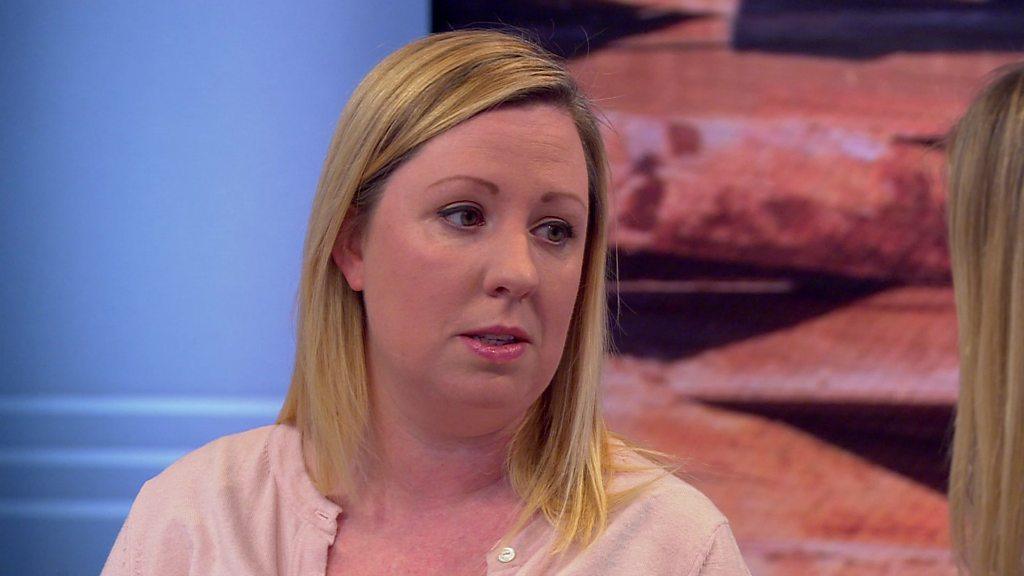Hyperemesis gravidarum: The mum whose morning sickness has never gone away
- Published
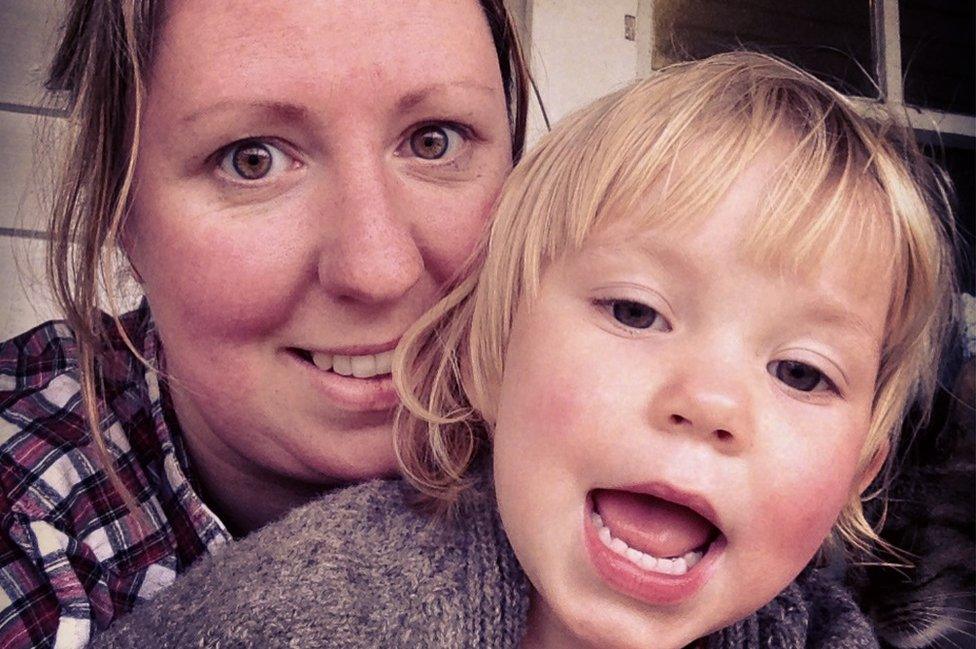
Caitlin Dean with daughter Orla: "Even though my second pregnancy was my worst, I knew I wanted three kids"
Extreme morning sickness has been given a higher profile in recent years because of the trials of the Duchess of Cambridge, who is pregnant with her third child. But few people know hyperemesis gravidarum (HG) can continue to affect women years after a baby is born.
Caitlin Dean, who has three children aged nine, seven and five, had extreme symptoms during all of her pregnancies.
"It literally felt like my whole body was being poisoned," said the 37-year-old.
"I was being sick 20 to 30 times a day and I got rapidly dehydrated.
"I was vomiting so violently I tore a stomach muscle, which has given me long-term back pain - and I consider I got off lightly."
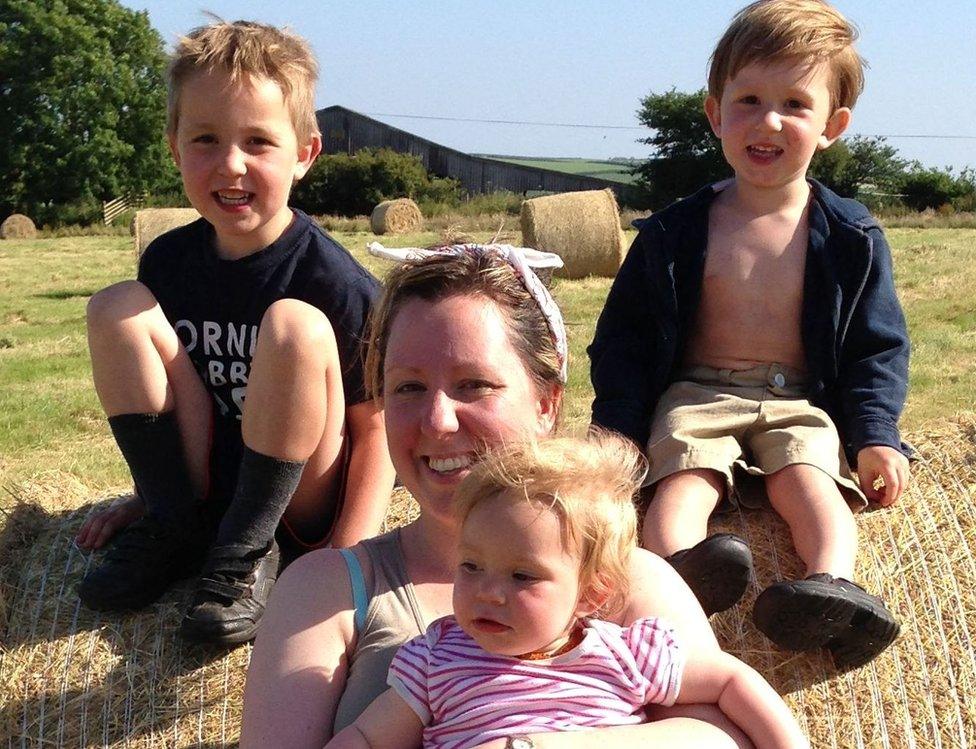
Mrs Dean with Alfie, Patrick and Orla: "HG has made me stronger and more resilient"
HG, which is thought to affect one in every 100 pregnant women, external, can cause sufferers to lose more than 5% of their normal body weight because they are unable to keep food and liquids down.
Vitamin deficiencies, and other issues associated with malnutrition, can lead to long-lasting symptoms.
Some women suffer so badly they are prepared to terminate the pregnancy, or even consider taking their own lives.

You might also be interested in:

Mrs Dean, a registered general nurse from Lanlivery in Cornwall, had HG for the entire nine months of each of her pregnancies, becoming so malnourished during her second pregnancy with Patrick that he has severe dental problems.
"A lot of people think this condition ends when a baby comes and that simply isn't true," said Mrs Dean, who studies HG as part of a PhD course at Plymouth University.
"It's a life-changing condition and understanding that is really important."
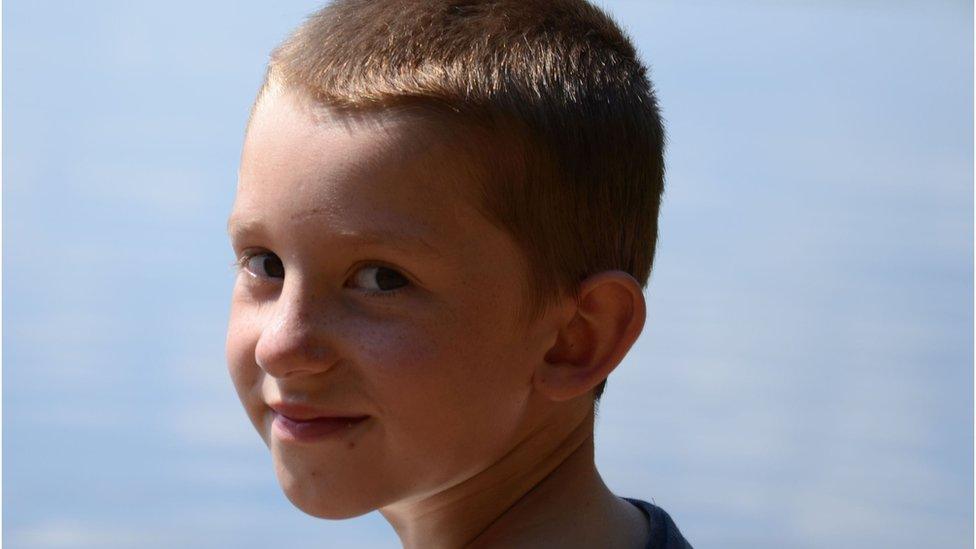
Patrick has dental problems as a result of his mother being undernourished during pregnancy
Cleaning her teeth or simply seeing the toilet can give her feelings of nausea even now.
"Even looking at the toilet can be problematic," she said. "I have to keep it really clean because of the memories. I get flashbacks of having my head in the loo.
"Brushing my teeth is also a problem if it foams too much.
"Most days that triggers memories," said Mrs Dean, who has a Facebook page called Spewing Mummy, external that offers information and advice for other sufferers.
Caitlin Dean describes how extreme morning sickness can still blight lives for years after a baby is born
She said that if her husband Rob, 39, drinks Earl Grey tea that still makes her retch.
"I liked Earl Grey, but there were so many times that I threw it up," she said.
"Even now, 10 years on, that smell reminds me of throwing up.
"I can almost feel the sensation of it."
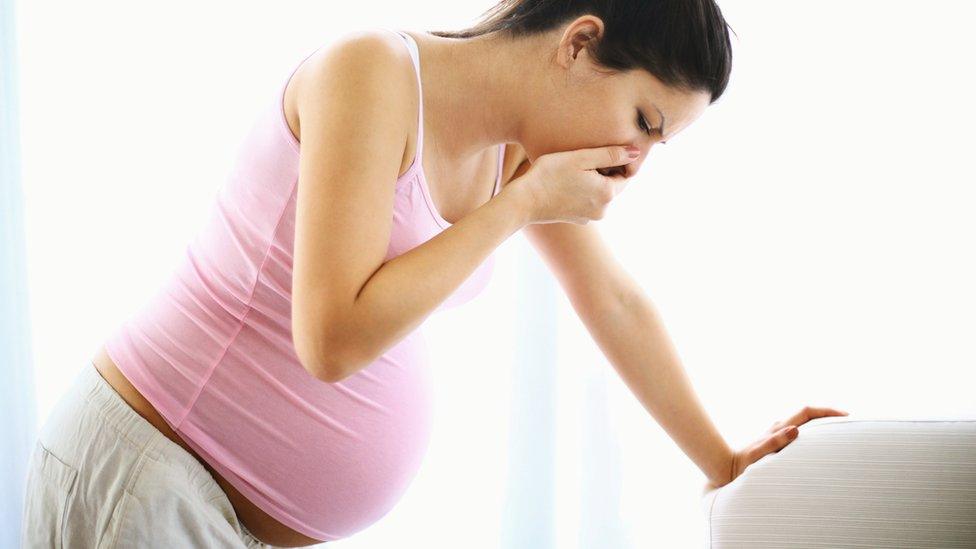
A new study by researchers at the University of California in Los Angeles, and published in the journal Nature Communications, external, suggests that HG is a physical illness connected with two genes, known as GDF15 and IGFBP7.
Mrs Dean said the discovery was "incredibly exciting" because it proved HG was a physical, not psychological, condition and suggests there could be a cure.
"For decades we haven't even had the hope of new medication to deal with this; all we have been doing is treating the symptoms," she said.
"This could open the line for a new type of antiemetic (anti-sickness drug) so we can treat the underlying cause.
"I think it gives a lot of hope for the future."
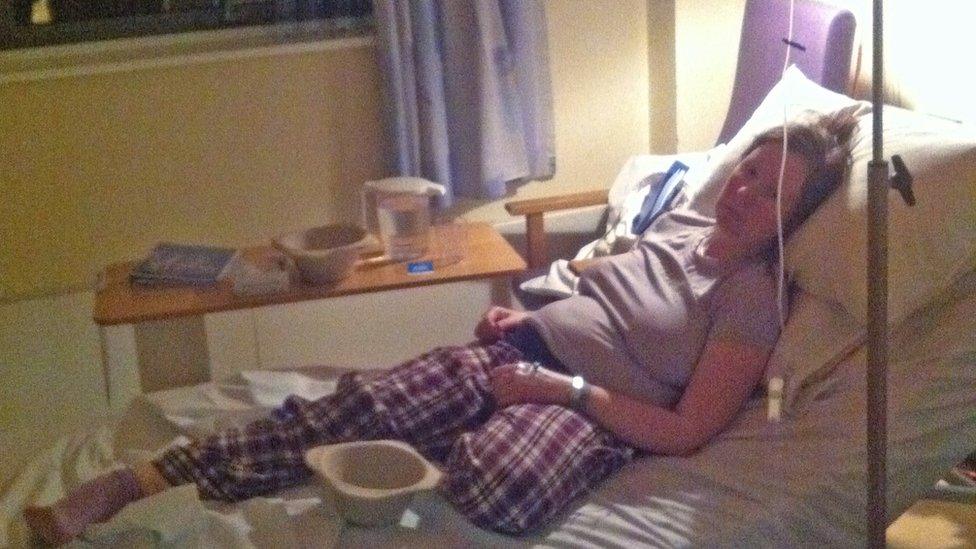
Mrs Dean in hospital with HG: "I was vomiting so violently I tore a stomach muscle"
Just driving down a nearby road where she was often sick still triggers feelings of nausea in Mrs Dean, who said that HG can be so debilitating for some women they consider other ways to become mothers.
"After our first baby we discussed pursuing adoption instead," she said.
"But we decided to power through it, even though my husband thought I was completely insane.
"And even though my second pregnancy was my worst, I knew I wanted three kids.
"I know it's a bit bloody-minded, and people tried to deter us from it, but I was determined and that's kind of me.
"It's also a reminder that I got through it and survived and I now feel that I am a stronger, more resilient person."
Spewing mummies - stories from other mothers
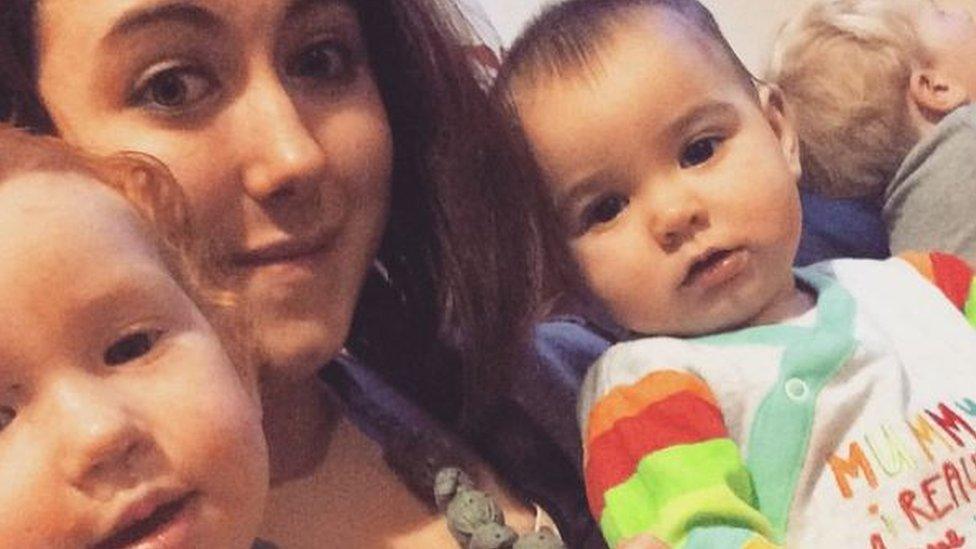
Jessica Atkinson, 25, from Devon, said she was still being sick two years after she gave birth
Jessica Atkinson, one of many mothers to share their experiences on Mrs Dean's Facebook page, wrote that HG changed her life and she is suffering with the consequences, two years on. "I still cannot eat certain foods due to the sickness and struggle to do simple things like brush my teeth due to my sensitive gag reflex."
Laura Heffernan, 32, from Mallow in County Cork, Ireland, said she was bedridden for most of her pregnancy and was vomiting 30 to 50 times a day. Her sense of smell became so heightened during pregnancy that certain odours made her vomit. Three years after she gave birth to her daughter, she still feels sick at the smell of scented candles and her partner's aftershave.
Caitlin Knight, 27, from Oregon, USA, was sick with HG for her entire pregnancy. "My daughter will be two in June," she said. "I have nausea daily. And when I wake up early in the morning I still throw up, usually only once thankfully."
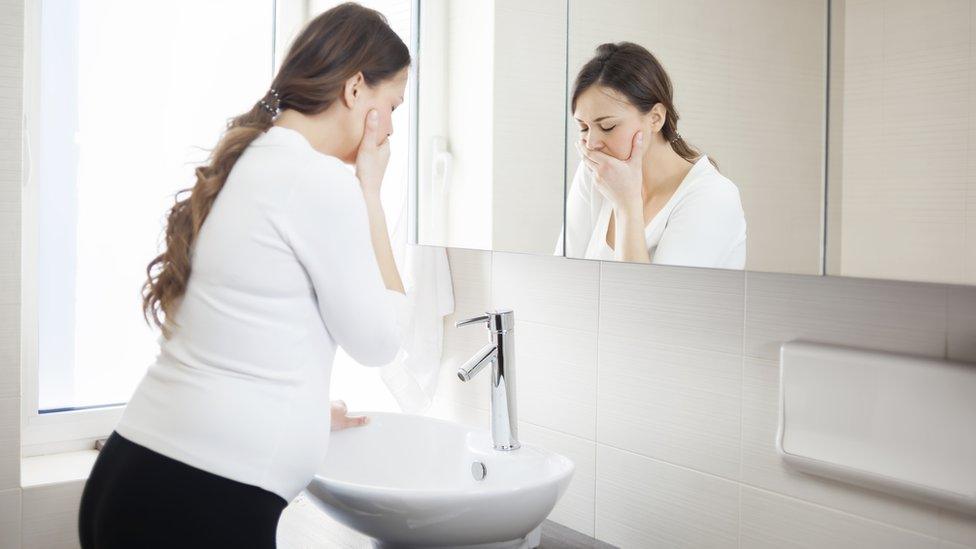
To get through the third pregnancy, Mr and Mrs Dean drew up a plan for social support and a nanny.
"We planned it like a military operation," she said.
However, her then-GP dismissed HG as a routine part of pregnancy and so she swapped doctors.
Her new GP helped Mrs Dean to create a support plan.
"I could phone her and just tell I needed intravenous fluids for rehydration," she said.
"So I still had to fight the condition but I did not have to fight for treatment because I was listened to and supported by the professionals."

The Dean family: Husband Rob juggled work so he could do all of the childcare
She also had a "huge amount of support" from her family and friends.
"I was in the fortunate position to be able to afford a nanny during the third pregnancy.
"My husband was also able to juggle work so he could do all of the childcare.
"But a lot of women do not have that luxury."
Perhaps surprisingly, Mrs Dean feels that the Duchess of Cambridge's well publicised battle with extreme morning sickness - she recently carried out her final royal duties before starting maternity leave - has had a "distressing flipside".
"I even heard a midwife say it's fashionable now because the Duchess of Cambridge suffered with it, which is just ridiculous and insulting to women," she said.

The Duchess of Cambridge has been carrying out her final royal duties before taking maternity leave
A report in the British Journal of Midwifery, external by Mrs Dean urges wider recognition of the after-effects of HG.
The British Pregnancy Advisory Service (BPAS) backed her call, saying it was "becoming clear that the effects of hyperemesis can be profound and long-lasting, both physically and mentally".
A BPAS spokeswoman said: "We believe one of the key challenges women face is having their voices heard and being believed" and that "too often women are dismissed".
She said some women were "left with little choice but to end a wanted pregnancy as their symptoms have become so severe and left them unable to work or care for their families".
"Whether an HG pregnancy ends in birth or termination it's vital women have access to the support they need."
The charity Pregnancy Sickness Support has a support forum, external people can use to share their experiences and get advice.
- Published6 October 2017

- Published16 September 2017
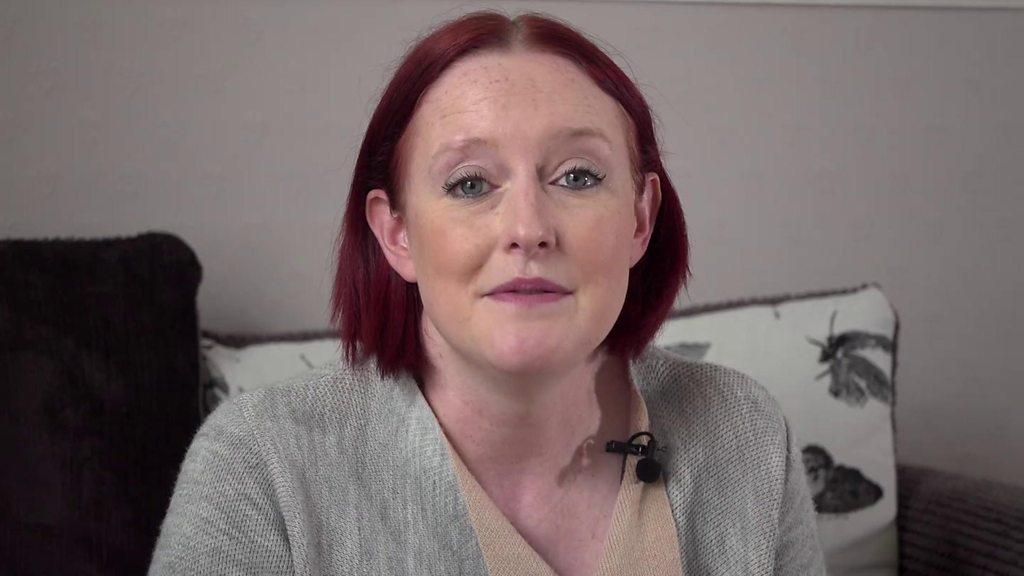
- Published4 September 2017

- Published2 March 2017

- Published2 March 2017
